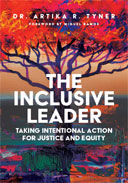
 |
The Inclusive Leader: Taking Intentional Action for Justice and Equity
by Dr. Artika R. Tyner
American Bar Association
Tyner's reference book serves as a comprehensive primer on the benefits of inclusive leadership, as well as a practical handbook for leaders in any organizational setting aiming to achieve, in real terms, greater diversity, equity, and inclusion. The volume is set into four primary sections, including developing core leadership competencies, team-building strategies, creating an inclusive workplace, and leadership as social justice. Tyner characterizes inclusive leaders as ones "who are aware of their own biases and preferences, and actively seek out and consider different views and perspectives to inform better decision-making." Here, leaders recognize "diverse talent as a source of competitive advantage" and inspire people to initiate "organizational and individual performance towards a shared vision." Arguing that outdated metaphors and oversimplification of the idea of "diversity" are no longer sufficient, Tyner instead presents a fresh perspective, beginning with assessing one's own leadership story, then offering tools for cultivating diverse talent while addressing such negative factors as implicit bias, privilege, cultural taxation, and micro-aggressions.
Undoubtedly, this reference book is well researched and exceedingly well written. The entirety of organizational leadership situations explored and the array of practical tools presented are equally germane in any setting one can imagine—business, medicine, academia, and indeed society at large. In fact, the entire fourth chapter explores issues of diversity, equity, and inclusiveness in a global context. Throughout the book, Tyner's passion regarding the intersection of social justice, writ large, with the potent opportunity individuals in positions of leadership have to effect change—for the betterment of all—becomes quite clear. Her rich personal and professional experiences add light to how and why justice, equity of access, teamwork, and building upon people's experiences with differing backgrounds and perspectives can all combine to enrich the climate of any organization, from top to bottom.
RECOMMENDED by the US Review